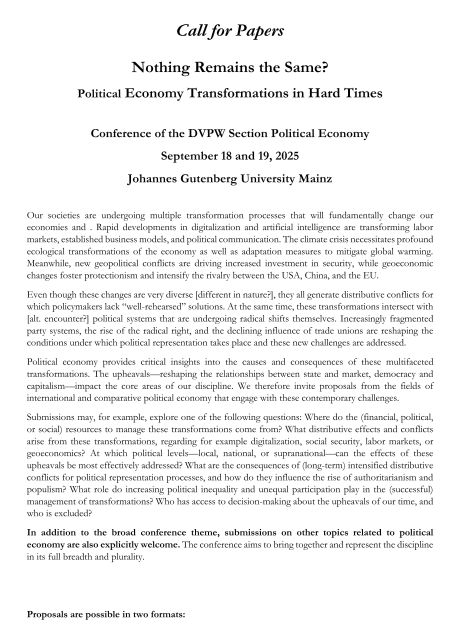
"Warum junge Männer die AfD wählen – und junge Frauen die Linke"
- (unter anderem) darüber habe ich mit dem Handelsblatt gesprochen: www.handelsblatt.com/politik/deut...
@jfrinken.bsky.social
PhD student @ Johannes Gutenberg University Mainz Political Theory trying to unpack the representative claim of mini-publics

"Warum junge Männer die AfD wählen – und junge Frauen die Linke"
- (unter anderem) darüber habe ich mit dem Handelsblatt gesprochen: www.handelsblatt.com/politik/deut...
I am looking for a PhD student in Comparative Politics @powimz.bsky.social. My research focuses on political (in-)equality, representation, and responsiveness. I would be grateful if you could help to spread the word.
stellenboerse.uni-mainz.de#/jgu/job/49637
I'm delighted to see this article out in @govandopp.bsky.social! Jonas Wenker and I show that losing an election has a far stronger negative effect on populist voters than on non-populist ones. For populists, losing signals that the system is broken. 1/5 www.cambridge.org/core/journal...
04.08.2025 17:20 — 👍 65 🔁 22 💬 1 📌 4
Are policy and process preferences structured by the same ideological dimensions? In a new paper now out in journals.sagepub.com/toc/iptb/21/2 I argue that policy preferences are associated with support for different logics of collective decision-making. More empirical research in the making!
21.07.2025 12:37 — 👍 16 🔁 6 💬 0 📌 0 08.07.2025 07:49 — 👍 6 🔁 5 💬 0 📌 0
08.07.2025 07:49 — 👍 6 🔁 5 💬 0 📌 0


JGU-Forschungspodcast-Moderator Lawrence Meinig (l.) mit Gesprächsgast Prof. Kai Arzheimer vom Institut für Politikwissenschaft der JGU (r.) (Foto/©: Philipp Neuweiler)
🎧 HÖRTIPP: #Forschungspodcast #MindsOfMainz – #DerGutenbergTalk | Folge 24: Wehrhafte #Demokratie – ein Bekenntnis zu Freiheit und gemeinsamen Werten | mit Prof. Kai Arzheimer 👉 www.magazin.uni-mainz.de/minds-of-mai...
@kai-arzheimer.com @powimz.bsky.social
#Politikwissenschaft #Innenpolitik


Today in our departmental seminar: Professor Simone Chambers speaking about the future of #democracy
28.05.2025 14:24 — 👍 9 🔁 4 💬 0 📌 1
#Forschungswerkstatt
#Democracy

People often overestimate how many others share their views—a phenomenon known as the false consensus effect.
In a new article in @ispp-pops.bsky.social, @clandwehr.bsky.social, Philipp Harms and I show that this tendency is associated with stronger populist attitudes: doi.org/10.1111/pops....

Looking forward to this semester's Political Science Research Lab @powimz.bsky.social 🎉
Starting next Wednesday, we have talks by @aleininger.bsky.social, @simonechambers.bsky.social, @manesweisskircher.bsky.social, @christopherojeda.bsky.social, Michael Zürn @wzb.bsky.social and others coming up!

Anti-pluralism is a term that repeatedly appears in the discussion about early warning signs of dem. backsliding. However, AP often remains un(der)theorized. In this paper I try to clarify what anti-pluralism is & why it is a useful marker for would-be autocratizers👇
doi.org/10.1007/s122...


Please spread the word! 👇
We are happy to announce that the next conference of the political economy section of the German Political Science association will take place @uni-mainz in September 2025. Join us to discuss "Political Economy Transformation in Hard Times"
Submission deadline February 15

The picture shows the title page of the paper "From latest buzzword to conceptual framework: Unraveling the complexities of democratic resilience" published in the German Journal of Comparative Politcs.
Happy to see this piece out in ZfVP🥳 Democratic resilience is a widely discussed topic, but the concept still shows some shortcomings. @lionmert.bsky.social, @matthiasrosenthal.bsky.social, Jana Niedringhaus, Johannes Helgest, and I address these systematically. A🧵:
doi.org/10.1007/s122...
Meine Rezension von Brigitte Geißels "Demokratie als Selbst-Regieren" ist heute auf dem pw-portal erschienen👇. Gutes Buch, wichtige Diskussion!
20.12.2024 08:20 — 👍 6 🔁 2 💬 0 📌 0
Wir gratulieren Johanna Speyer (@JohannaSpeyer) ganz herzlich zur Promotion 🎓🎉!
28.10.2024 16:05 — 👍 3 🔁 1 💬 0 📌 0
Do citizens in the East and West of Germany still think differently about democracy? A new paper by Lea Stallbaum uses ESS 10 data to show that cohorts socialized in the GDR still hold more socialist and populist conceptions of democracy while the young converge.
www.tandfonline.com/doi/full/10....

Ich durfte zu dem gerade erschienenen interdisziplinären Sammelband "Kann das Anthropozän gelingen?" einen Text über "Bürger:innenräte als Institutionen demokratischer Klimapolitik" beisteuern. Freue mich, dass so ein vielseitiger und bereichernder Band entstanden ist!
05.02.2024 11:13 — 👍 8 🔁 2 💬 0 📌 0
A photo of Eva Krick.

A photo of Paula Jöst.

A photo of Theresa Bernemann.
Three great talks in the last 8 days. Eva Krick, Paula Jöst and Theresa Bernemann really kicked it!
15.12.2023 11:59 — 👍 11 🔁 4 💬 0 📌 0

Wow! I just got the news that our PhD student @matthiasrosenthal.bsky.social has won the Democratic Innovation section's Best Paper Award for his paper presented at ECPR GC in Prague. Congratulations and well deserved, Matthias! 🎉 @kaiarzheimer.bsky.social
15.12.2023 08:01 — 👍 20 🔁 6 💬 1 📌 0
This blogpost provides a concise summary of a paper I presented at the summer school on "Electoral Democracy in Danger!?" organized by @rdassonneville.bsky.social and @rlachat.bsky.social: www.fmsh.fr/en/publicati... This might be interesting to those of you who work on democratic regression 👇
12.12.2023 09:33 — 👍 6 🔁 2 💬 0 📌 0
An overview of the talks to be held at the Institute of Political Science at the University of Mainz in the coming months.
The Democracy Seminars have a great series of talks coming up this term! @clandwehr.bsky.social @nilssteiner.bsky.social @kwalz.bsky.social @jfrinken.bsky.social
06.12.2023 22:25 — 👍 16 🔁 9 💬 1 📌 0
Very happy to see this polisky published: doi.org/10.1016/j.el...!
I use age-period-cohort analysis with data from all 20 German federal elections (1949-2021) to answer 2 questions:
1. How has party support shifted across generations?
2. Has the effect of education on voting changed across gener.?

Cover and back of the newly published book "The Democratic Regression" by Armin Schäfer & Michael Zürn.

I am very happy to have received a copy of our book 'The Democratic Regression'. It is a translation from the German version and offers a political explanation of the rise of authoritarian populism.
polisky

ABSTRACT Democracy’s resilience arguably depends on political elites’ loyalty to the political system. How do elected representatives understand democracy and their own role in it? We present results of a survey conducted among German legislators in state parliaments and the Bundestag in 2022. We start by mapping the scope and content of consensus and dissent where principles of democracy and their institutionalisation are concerned and go on to hypothesise that congruence between one’s own conceptions of democracy and established institutions and practices is generally higher among established and government parties’ representatives but also dependent on ideological inclinations. Our results are overall reassuring, showing a relatively low level of polarisation in attitudes to democracy, and have implications for the study of political elites, for diagnoses of political polarisation in Germany and for the possibility and feasibility of institutional reform.
How do elected representatives understand democracy and their own role in it?
In a new paper with Leonard Häfner and Lea Stallbaum in German Politics, we present results of a survey conducted among German legislators in state parliaments and the Bundestag in 2022:
www.tandfonline.com/doi/full/10....


Der Vizepräsident der JGU, Professor Dr. Stephan Jolie, verleiht unserer Kollegin Dr. Annette Schmitt den Lehrpreis - wir gratulieren!
09.11.2023 16:43 — 👍 6 🔁 5 💬 1 📌 1
In the eyes of many citizens, democracy fails to meet its promises. In a new paper just published in Res Publica, Armin Schäfer and I argue that deliberative responsiveness constitutes a promise representative democracy can and should fulfill.
Open access link: rdcu.be/dp9lj